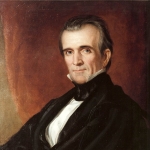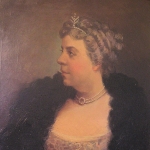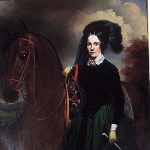Background
Sarah Childress was born to a wealthy family in Murfreesboro, Tennessee, on September 3, 1803. Her father, Captain Joel Childress, and her mother, Elizabeth, were planters and innkeepers.

Sarah and James K. Polk
The Polks on the portico of the White House alongside Secretary of State James Buchanan, and former first lady Dolley Madison.
Sarah with her niece, Sallie
Polk in her later years by George Dury
Polk Place in Nashville where Sarah would spend over 42 years of her widowhood.





First Lady of the United States president's wife
Sarah Childress was born to a wealthy family in Murfreesboro, Tennessee, on September 3, 1803. Her father, Captain Joel Childress, and her mother, Elizabeth, were planters and innkeepers.
Sarah lived a life of elegance as a child and was also encouraged to be self-confident forough good schooling. She was tutored at home and then sent to a private Nashville school for girls before being accepted at age thirteen to the Salem Female academy in North Carolina, considered the finest school for girls in the area. It had been founded by Moravians, a Protestant religious sect that emphasizes missionary work. Sarah’s sister also attended the school, but returned to Murfreesboro one year later, when their father died.
The family’s wealth allowed Sarah to avoid menial chores, and she spent most of her time reading and studying the Bible. She became acquainted with James K. Polk when he went to Murfreesboro to serve as a clerk for the Tennessee legislature. Reportedly, their romance was encouraged by Andrew Jackson, a war hero and politician familiar with both the Polk and the Childress families.
During his political career, Polk assisted her husband with his speeches, gave him advice on policy matters and played an active role in his campaigns. In Washington as a congressman's wife during the administrations of John Quincy Adams, Andrew Jackson, and Martin Van Buren, Polk very much enjoyed her social duties. In 1830 she risked a breach with Jackson, her husband's mentor, by taking part in the social ostracism of Peggy Eaton, during the Petticoat affair, although she continued to greet Eaton, unlike Vice President John C. Calhoun's wife, Floride Calhoun, and most of the cabinet members' wives.
In 1845, Sarah Polk became the 11th First Lady of the United States. President Polk at times discussed policy matters with her. While she enjoyed politics, she also cautioned her husband, whose health was never robust, against overwork.
A devout Presbyterian, as First Lady she banned dancing, card games, and hard liquor at official receptions. Unlike Julia Tyler's waltzes, the Polk entertainments were sedate and sober affairs which earned the First Lady the nickname "Sahara Sarah".
After attending the inauguration of Zachary Taylor on March 5, 1849, Polk and her husband left by horse and carriage to their new home, Polk Place, in Nashville, Tennessee. Three months later, James Polk died of cholera, having had the shortest retirement of any U.S. president.
Polk remained in Polk Place throughout these later years of her widowhood rarely leaving, becoming a bit of a recluse. She did not start hosting guests until a few years after her husband's death. She hosted distinguished and popular guests throughout her widowhood, such as Abram Hewitt, Edward Cooper, John C. Calhoun II, John Catron, George Bancroft, among numerous others, including Presidents Rutherford B. Hayes and Grover Cleveland.
Once widowed, Polk unofficially adopted a great-niece, Sarah Polk Jetton, nicknamed "Sallie", and saw her as her own daughter. After Polk's niece died, she was brought to live with Polk. They lived together in Nashville until Polk's death in 1891.
Sarah Polk lived at Polk Place for 42 years, the longest retirement and widowhood of any former US first lady, and always wore black as a true Victorian widow.
Sarah Polk was popular as first lady, even as a few critics continued to wonder about how great an influence she had on her husband and the nations’ affairs. Nevertheless, after Polk left office in 1849, Sarah was cited by Peterson’s Magazine, a national journal, as among the most admirable women and role models
During her time in Washington, Sarah Polk was admired by progressive thinkers, including Supreme Court justice Joseph Story, and such outspoken women as Marcia Van Ness, a social activist; Floride Calhoun, wife of Senator John C. Calhoun; and Josephine Seaton, a writer and newspaper editor. They did not share all of the Polks’ political views, but they valued Sarah Polk for her own opinions and good judgment. Sarah’s political involvement, although mostly private, was rarely seen in first ladies up until that time.
Publicly, she proved to be an excellent hostess and conversationalist, even as she refused - as a strict Presbyterian - to attend theaters or sporting events and forbade alcohol at gathering she hosted. She freely expressed her opinions with a charm and good humor that won over critics who believed that the wives of politicians should be seen and not heard. Occasionally, she was accused of controlling her husband, bur Polk freely sought her advice an assistance on spite of the wagging tongues.
Quotations: " It is only the hope that you can live through the campaign that gives me a prospect of enjoyment".
She was lively, charming, intelligent, and a good conversationalist.
Quotes from others about the person
Polk presidential historian Charles Sellers called her "increasingly indispensable" to her husband as secretary, political counselor, nurse, and emotional resource."
Sarah Childress met James K. Polk while both were receiving instruction from Samuel P. Black at his house in Murfreesboro, Tennessee. He was 19, she was 12. They would be formally introduced in the early 1820s with Polk's involvement with the State Legislature. Shortly after he began courting her. Legend says Andrew Jackson called her "wealthy, pretty, ambitious, and intelligent," and urged Polk to marry her. In 1823 the two became engaged, and on January 1, 1824, Sarah Childress, aged 20, married James Polk, aged 28, at the plantation home of the bride's parents near Murfreesboro.
Of their 25 years of marriage they would never have children, often attributed to the bladder stone surgery Polk had as a young man making him sterile. They were the only presidential couple to never have children while together, biologically, adopted or from previous marriage.
They raised a nephew, Marshall Tate Polk (1831–1884), as their ward for a few years before James sent him to a school in Washington, D.C. and later Georgetown University. After her husband's death, Sarah would foster her great niece, Sarah Polk Fall (1847-1924).


(1831–1884)

